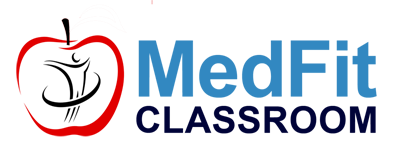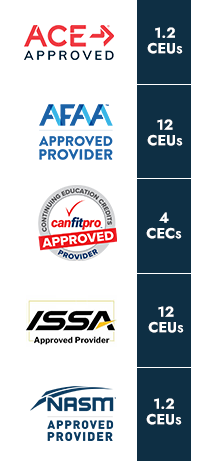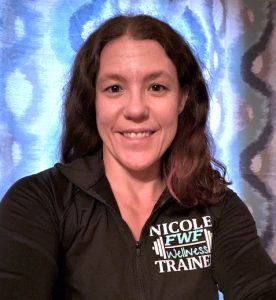Module 1: Introduction to Substance and Alcohol Use Disorders
Lesson 1 (M1L1): Introduction to Substance Use Disorders
Lesson 2 (M1L2): The Process of Addiction
Lesson 3 (M1L3): Diagnosis of Substance Use Disorder and Mental Health Co-Morbidities
Lesson 4 (M1L4): Treatment for Substance Use Disorders
Lesson 5 (M1L5): Activity – Attend an Alcoholics Anonymous Meeting
Module 2: Alcohol
Lesson 6 (M2L1): How Does Alcohol Addiction Begin?
Lesson 7 (M2L2): The Pathophysiology of Alcohol Use Disorder
Lesson 8 (M2L3): Short and Long-Term Effects of Chronic Alcohol Use
Lesson 9 (M2L4): Nutrition Considerations
Lesson 10 (M2L5): Training Considerations for Clients with Alcohol Use Disorder
Lesson 11 (M2L6): Assessment and Program Design for Clients with Alcohol Use Disorder
Lesson 12 (M2L7): Activity – Conduct an Assessment and Create a Program
Module 3: Opiates
Lesson 13 (M3L1): How Does Opiate Addiction Begin?
Lesson 14 (M3L2): The Pathophysiology of Opiate Use Disorder
Lesson 15 (M3L3): Short and Long-Term Effects of Chronic Opiate Abuse
Lesson 16 (M3L4): Nutrition Considerations
Lesson 17 (M3L5): Training Considerations for Clients with Opiate Addiction
Lesson 18 (M3L6): Assessment and Program Design for Chronic Opiate Users in Recovery
Lesson 19 (M3L7): Activity – Attend a Narcotics Anonymous (NA) Meeting
Module 4: Stimulants
Lesson 20 (M4L1): How Does Stimulant Addiction Begin?
Lesson 21 (M4L2): The Pathophysiology of Stimulant Addiction
Lesson 22 (M4L3): Short and Long-Term Effects of Chronic Illegal Stimulant Abuse
Lesson 23 (M4L4): Nutrition Considerations
Lesson 24 (M4L5): Training Considerations, Assessment and Program Design for Clients in Recovery from Chronic Stimulant Abuse
Lesson 25 (M4L6): Activity – Review and Create S.M.A.R.T. Goals Appropriate for This Population
Module 5: The Mind Body Connection: Yoga and Meditation in the Rehabilitation Setting
Lesson 26 (M5L1): The Practice of Yoga
Lesson 27 (M5L2): Meditation in Practice
Lesson 28 (M5L3): Building Rapport
Lesson 29 (M5L4): Considerations for Yoga/Meditation Practice in the Recovery Population
Lesson 30 (M5L5): Activity – Listen to a Regular and a Modified Meditation
Module 6: Group Fitness for the Recovery Population
Lesson 31 (M6L1): Benefits of Group Fitness in the Recovery Population
Lesson 32 (M6L2): Class Design in the Drug Rehabilitation Facility Setting
Lesson 33 (M6L3): Music Selection
Lesson 34 (M6L4): Coaching Skills and Enhancing Class Motivation
Lesson 35 (M6L5): Activity – Design a Sample Group Fitness Class for an In-Patient Drug Rehabilitation Facility
Module 7: Relapse Prevention
Lesson 36 (M7L1): Factors That Lead to Relapse
Lesson 37 (M7L2): The 12-Steps and Relapse Prevention
Lesson 38 (M7L3): The Role of Exercise in Relapse Prevention
Lesson 39 (M7L4): Other Addictive Behaviors
Lesson 40 (M7L5): Activity – Find and List Activities in Your Community Appropriate for Sober Living
Module 8: Business Planning and Scope of Practice
Lesson 41 (M8L1): Scope of Practice
Lesson 42 (M8L2): Legal Issues and Privacy
Lesson 43 (M8L3): Business Proposals and Contracts
Lesson 44 (M8L4): Activity – Design a Business Plan/Proposal
Competency Assessment: Drug and Alcohol Recovery Fitness Specialist
Epilogue: Drug and Alcohol Recovery Fitness Specialist Course – What Should I Do Next?





